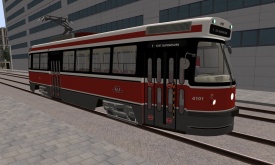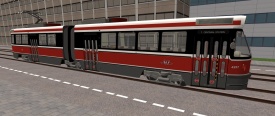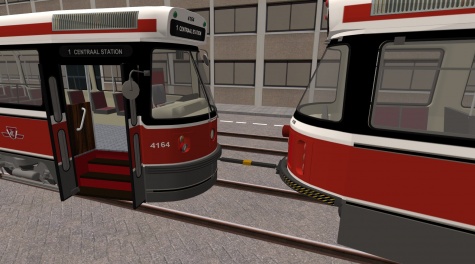CLRV: Difference between revisions
No edit summary |
|||
| (7 intermediate revisions by 4 users not shown) | |||
| Line 1: | Line 1: | ||
{{Rolling stock | {{Rolling stock | ||
| | |name = Toronto CLRV & ALRV | ||
| | |image = TTC_CLRV_002.jpg | ||
|size = 275px | |||
|description = [[File:TTC_ALRV_002.jpg|275px]] | |||
|series = | |series = 4101-4175 <br>4201-4252 | ||
| | |traction = overhead wire | ||
|protection = | |protection = [[ATB]]/[[ROZ]] max. 80km/h | ||
| | |download = {{TorontoLink}} | ||
}} | }} | ||
'''Note 23-12-2021:''' Updated to be compatible with Hageningen tram network in Metrosimulator 3.17, by adding "ROZ" (Rijden op Zicht / Drive on sight, as alternative to ATB and ZUB train protection). | |||
If you want to use these trams on this tram network and you have downloaded this package before this date, please re-download. | |||
The Canadian Light Rail Vehicle (CLRV) is a tram used by the Toronto Transit Commission (TTC). They have been the prevalent rolling stock on the Toronto tram system since the late 1970s. Two variants have been produced and are in use: the standard, single-module CLRV and the longer, articulated, double-module "Articulated Light Rail Vehicle" (ALRV). | The Canadian Light Rail Vehicle (CLRV) is a tram used by the Toronto Transit Commission (TTC). They have been the prevalent rolling stock on the Toronto tram system since the late 1970s. Two variants have been produced and are in use: the standard, single-module CLRV and the longer, articulated, double-module "Articulated Light Rail Vehicle" (ALRV). | ||
196 CLRV's have been | 196 CLRV's have been built. The first six CLRV cars (4000–4005) were manufactured by SIG of Zurich, Switzerland, and used as prototypes for the Urban Transportation Development Corporation (UTDC) (now Bombardier) to manufacture subsequent CLRVs at the Thunder Bay works of Hawker Siddeley Canada (today also part of Bombardier).<br> | ||
Of the ALRV, one prototype (4200) | Of the ALRV, one prototype (4200) and 52 service-trams (4201-4252) have been built. The prototype did run in passenger service, but was withdrawn in 1983. | ||
==Operations In Simulator== | ==Operations In Simulator== | ||
| Line 25: | Line 29: | ||
- Station Buitenvelden - Statenpolder <br> | - Station Buitenvelden - Statenpolder <br> | ||
<br> | <br> | ||
Rijndam 2022 Full version (1.2): <br> | Rijndam 2022 Full version (1.2/1.3.1): <br> | ||
- Centraal Station - Garenmarkt <br> | - Centraal Station - Garenmarkt <br> | ||
- Centraal Station - Station Buitenvelden <br> | - Centraal Station - Station Buitenvelden <br> | ||
- Centraal Station - Statenpolder <br> | - Centraal Station - Statenpolder <br> | ||
- Station Buitenvelden - Statenpolder <br> | - Station Buitenvelden - Statenpolder <br> | ||
<br> | |||
[[Toronto_Streetcar]]: <br> | |||
- Entire network <br> | |||
<br> | <br> | ||
On the Metrosimulator model, the trolley pole has been replaced by a pantograph, as the simulator does not support the use of a trolley. <br> | On the Metrosimulator model, the trolley pole has been replaced by a pantograph, as the simulator does not support the use of a trolley. <br> | ||
| Line 40: | Line 48: | ||
Known 'problem'; the doors open (rotating) to the outside, are lower than the platform height of tram stops in Rijndam. Therefore, the doors will hit the platforms. A few platforms in Rijndam 2022 (v1.2) have been lowered a bit for this reason, but not all.<br> | Known 'problem'; the doors open (rotating) to the outside, are lower than the platform height of tram stops in Rijndam. Therefore, the doors will hit the platforms. A few platforms in Rijndam 2022 (v1.2) have been lowered a bit for this reason, but not all.<br> | ||
<br> | <br> | ||
The CLRV trams did have couplings when they where delivered to the TTC, but | The CLRV trams did have couplings when they where delivered to the TTC, but they were never used in regular passenger service (only on special occasions). Eventually, to improve safety, they where removed in 1988. Now, if a defective unit needs to be towed away, an emergency coupling is used. This coupling, however, is not suitable for passenger service. In the simulation, you can couple two units together in the normal way. When the connection is made, the emergency coupling will appear. The ALRV's were never fitted with (normal) couplings, except for the prototype. | ||
[[File:TTC_CLRV_003.jpg|475px]] | [[File:TTC_CLRV_003.jpg|475px]] | ||
Latest revision as of 12:34, 31 December 2021
| Toronto CLRV & ALRV | ||||||
|---|---|---|---|---|---|---|
 | ||||||

| ||||||
| Series | ||||||
| 4101-4175 4201-4252 | ||||||
| Traction power supply | ||||||
| overhead wire | ||||||
| Protection | ||||||
| ATB/ROZ max. 80km/h | ||||||
| Download |
Note 23-12-2021: Updated to be compatible with Hageningen tram network in Metrosimulator 3.17, by adding "ROZ" (Rijden op Zicht / Drive on sight, as alternative to ATB and ZUB train protection). If you want to use these trams on this tram network and you have downloaded this package before this date, please re-download.
The Canadian Light Rail Vehicle (CLRV) is a tram used by the Toronto Transit Commission (TTC). They have been the prevalent rolling stock on the Toronto tram system since the late 1970s. Two variants have been produced and are in use: the standard, single-module CLRV and the longer, articulated, double-module "Articulated Light Rail Vehicle" (ALRV).
196 CLRV's have been built. The first six CLRV cars (4000–4005) were manufactured by SIG of Zurich, Switzerland, and used as prototypes for the Urban Transportation Development Corporation (UTDC) (now Bombardier) to manufacture subsequent CLRVs at the Thunder Bay works of Hawker Siddeley Canada (today also part of Bombardier).
Of the ALRV, one prototype (4200) and 52 service-trams (4201-4252) have been built. The prototype did run in passenger service, but was withdrawn in 1983.
Operations In Simulator
As this is a unidirectional vehicle, you can only use this tram on routes with turning loops on both ends.
Rijndam 2020 and Rijndam 2022 Light version:
- Station Buitenvelden - Statenpolder
Rijndam 2022 Full version (1.1):
- Centraal Station - Station Buitenvelden
- Centraal Station - Statenpolder
- Station Buitenvelden - Statenpolder
Rijndam 2022 Full version (1.2/1.3.1):
- Centraal Station - Garenmarkt
- Centraal Station - Station Buitenvelden
- Centraal Station - Statenpolder
- Station Buitenvelden - Statenpolder
Toronto_Streetcar:
- Entire network
On the Metrosimulator model, the trolley pole has been replaced by a pantograph, as the simulator does not support the use of a trolley.
The models are equipped with two passenger views;
6 - Middle of the tram; open area next to the doors
7 - Back seats
Known 'problem'; the doors open (rotating) to the outside, are lower than the platform height of tram stops in Rijndam. Therefore, the doors will hit the platforms. A few platforms in Rijndam 2022 (v1.2) have been lowered a bit for this reason, but not all.
The CLRV trams did have couplings when they where delivered to the TTC, but they were never used in regular passenger service (only on special occasions). Eventually, to improve safety, they where removed in 1988. Now, if a defective unit needs to be towed away, an emergency coupling is used. This coupling, however, is not suitable for passenger service. In the simulation, you can couple two units together in the normal way. When the connection is made, the emergency coupling will appear. The ALRV's were never fitted with (normal) couplings, except for the prototype.
Special animations
Ctrl+Shift+X - Activate/deactivate window wipers
External links
https://en.wikipedia.org/wiki/Canadian_Light_Rail_Vehicle
https://transit.toronto.on.ca/streetcar/4503.shtml
